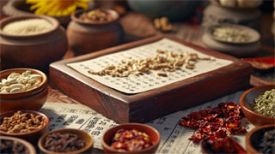
If one does not follow the principles of qi and goes against the principles of the flesh, it will lead to carbuncle and swelling. "-" Yellow Emperor's Inner Canon, Su Wen, Qi Qi Tong Tian Lun Chapter 3 "
We read the original text: "If the qi does not obey and goes against the principles of the flesh, it can lead to carbuncles and swelling
The literal meaning of this sentence is very simple, 'camp' refers to the 'camp' of the guard's aura. 'Not following' means not following. The ancients often said obedience, and 'from' usually refers to the meaning of obedience. For example, as we mentioned earlier: 'Tranquil emptiness, true qi follows from it.' Here, 'follow' refers to the smooth flow and obedience. The "flesh texture" that goes against the "flesh texture" refers to the pores. The term 'Ying' refers to blood, while 'Wei' refers to qi. So, traditional Chinese medicine talks about the Qi of Ying Wei, where Wei refers to Qi and Ying refers to Blood. The 'non conformity' of 'Ying Qi' is not smooth, it is reverse. Therefore, if Ying Qi is reversed, blood will become stagnant. After blood stagnation, it will heat up and accumulate into pus, which will turn into abscess and swelling, so 'it is the origin of abscess and swelling'. To connect with the context, let's take a look at the earlier part. Cold qi penetrates deep into the blood vessels, "Yu Qi is thin, transmitted as fear and shock." This is the previous statement. If the qi cannot move from the meridians it should go through, cannot move from the meridians and blocks the muscles, "against the flesh," it means going against or blocking the muscles, and over time it becomes an abscess. This explanation is very meaningful for guiding clinical practice.
We also encounter this phenomenon in clinical practice. After a long period of blood stasis, two types of changes will occur. One is as mentioned in the "Su Wen Wu Zhu": "When the Yin is reversed, blood stasis occurs; when blood stasis accumulates heat and becomes pus, it is called abscess." This is a common situation in clinical practice. Some patients, after experiencing stagnation of qi and blood, develop the disease of carbuncle. Some people have it on their back, while others have it on their waist, usually on their back. There are few carbuncles in the abdomen, and most of them are located in the muscle layer. Some carbuncles are swollen without a head, while others have a head. If there is a head, it will automatically rupture and the wound will heal; A swollen and headless area means that the entire area has swelled up without a head that has pus flowing out. This is more difficult to treat and only requires going to the hospital for incision, drainage, and closure. In short, abscesses must release the pus inside and allow it to circulate. Many people ask how a abscess without bacteria can be caused? Most of it is because of the traditional Chinese medicine saying that it is fat, sweet, and rich in flavor. As we mentioned earlier, the transformation of sorghum has led to the growth of large grains. Eating fatty, sweet, and rich foods has become more common. "Gao" refers to fatty and fatty foods, while "liang" refers to fine grains. The 'Gaoliang Incident' refers to the consumption of refined grains and fatty meat, and generally refers to all high calorie foods, which is called 'Gaoliang'. 'Foot' means sufficient, not necessarily referring to feet. We have previously specifically mentioned that 'the change in the height of the beam causes the growth of large bones in the foot', which is sufficient to cause diseases such as sores and abscesses. These are all diseases caused by internal heat leading to blood stasis, which is called abscess.
By extension, we can see that 'going against the principles of the flesh' refers to the muscle layer. If the qi and blood flow are not smooth, what other pathological changes may occur? It is a disease that we encounter in clinical practice, which is more common in women and more common in women. Why do women have more? Because 'women are based on blood, men are based on qi', 'qi based' refers to the spleen, stomach, and kidneys, one innate and one acquired. The liver stores blood, so the focus for women is on nourishing the liver, while the focus for men is on nourishing the spleen and kidneys, which is different. So, when we look at clinical treatment, there are differences in medication.
Why do women nourish their liver? Because most women, after reaching adulthood and getting married and having children, focus more on their families. This is the family environment in China, where both men and women work. However, in general, in terms of social division of labor, men tend to focus more on external careers, while women tend to focus more on the family. This is the traditional Chinese family structure. Under these conditions, the female leads the family and her focus is usually on the home, as children are born and grow up. I have found that in clinical practice, there are many families where mothers play a crucial role in educating their children. Many mothers lack experience in education and often let their childishness go unchecked. Children who don't study, procrastinate on homework, and have poor exam results, coupled with their rebellious mentality as they grow up, such as disobedient, unruly, and not studying well, often make mothers angry about their children's education. When a woman gets angry, she becomes depressed in the liver, and when the liver blood becomes depressed, it is called 'going against the principles of the flesh'.
Disclaimer: This article is a sharing of health knowledge. The drugs, prescriptions, acupuncture and moxibustion and other treatment and health preserving methods mentioned in this article should be applied under the guidance of professional doctors, and should not be applied by yourself. We are not responsible for any issues arising from improper use.


